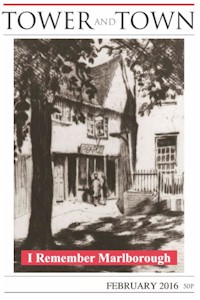

Tower and Town, February 2016 (view the full edition) (view the full edition)George JohnsonGeorge grew up in Marlborough, the youngest of three children whose father was a painter and decorator. In the 2nd World War he was conscripted as a ‘Bevin Boy’ and did his war service in the mines of South Wales. There, ‘in the canteen’, he met Nan, a miner’s daughter. They married in 1948 after George was demobbed, a marriage that lasted 60 years. Back in Marlborough he worked as a painter for Eade’s and after living ‘on the corner’ where Dible and Roy are now, George and Nan had their own house built and gave it its unpronounceable Welsh name. From 1963, he went to work at the College and became general foreman in the Estate department; after he retired, he continued as supervisor in the dining hall, a job which he still does, valued for his straight and easy manner with the pupils, to whom he is ‘George’. The Marlborough that George describes has changed greatly – a town now without the building firms (Ledleys, Burts, Eustace and Hilliers), without many of the pubs (like ‘The Bell and Shoulder of Mutton’ in Kingsbury Street) and without the plethora of small shops. He mentions Hilliers, the greengrocers, in Kingsbury Street; Hart’s, the bakers, down the Parade; the ‘The Green Parrot’ sweet shop by St Peter’s Church; and Miss Pearce’s shop off the Green, where they ‘sold general goods’ George served for over thirty years in the local ‘retained’ fire brigade, staffed by volunteers, many of them in the ‘building trade’. Up to 1926, the fire engine was horse-drawn and during the 2nd World War the engine was ‘a Fordson flat-bed lorry with a tank of water on the back – a Heath Robinson effort’. He and his colleagues were called out for the major fires that scarred Marlborough in our time: Dible and Roy’s, where the One Stop and Post Office are today; the Polly, for which (George is reticent here) he, Frank Odey and Bob Cox were awarded the Queen’s Commendation for Bravery for rescuing the children upstairs; and the tannery, where ‘the water froze’ as they pumped it from the river. After George retired, he was awarded the medal for long service and the BEM. John Osborne |